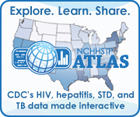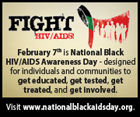Media Statement
For Immediate Release
Contact: National Center for HIV/AIDS, Viral Hepatitis, STD, and TB Prevention
(404) 639-8895
National HIV Testing Day – June 27, 2010
Statement by Dr. Kevin Fenton
Director,
National Center for HIV/AIDS, Viral Hepatitis, STD, and TB Prevention
Centers for Disease Control and Prevention
More than 200,000 people in the United States are living with a potentially deadly virus – HIV – and don’t know it. On this National HIV Testing Day, I urge all Americans to get tested for HIV and to encourage friends and family to do the same. No single step can do more to stop the spread of HIV and improve the health and prolong the lives of those who are infected.
The U.S. HIV epidemic is far from over. Every year, about 56,000 Americans become infected with HIV and nearly 18,000 with AIDS die. More than 1 million people in this country are living with the virus.
HIV testing is key to ending the U.S. HIV epidemic.
- Testing is a powerful prevention tool. CDC estimates that people who don’t know they’re infected account for the majority of new sexually transmitted HIV infections in the United States. But studies show that once individuals learn they are infected, most take steps to protect others from infection.
- Testing is a critical link to life-prolonging treatment. The earlier a person with HIV is diagnosed and linked to medical care, the better chance he or she has of living a long, full life. But today, nearly one-third of those who are infected are diagnosed with AIDS within a year of their initial HIV diagnosis, indicating they already have been infected for many years and antiretroviral (ARV) therapy will be less effective.
- Treating those identified through testing may also help prevent the spread of HIV. ARV therapy can reduce the level of virus in the blood and genital secretions, which may decrease the chance than an infected person will transmit HIV to others. It is important that, once someone tests positive for HIV, they talk with their healthcare provider about ARV treatment.
Everyone deserves life-saving information about their HIV status.
CDC recommends that all Americans between the ages of 13 and 64 get tested for HIV at least once as a routine part of medical care, regardless of their risk behavior. No one should walk out of a doctor’s office without knowing his or her HIV status.
CDC also recommends that those at higher risk for HIV get tested at least annually. This includes gay and bisexual men, anyone with multiple sexual partners, those with HIV-positive partners, and injection-drug users and their sex partners.
Testing is especially important for gay and bisexual men, who make up the majority (53 percent) of new HIV infections in the United States, and who comprise the only risk group for which new infections are increasing. Yet many gay and bisexual men are not getting tested often enough: 30 percent have not been tested for HIV within the last year, and a study in five large cities found 48 percent of HIV-positive gay and bisexual men were unaware of their status.
HIV testing and early diagnosis are also critical for African-Americans, who bear the greatest HIV burden of any racial/ethnic group. While blacks test for HIV at higher rates than other populations, 31 percent have never been tested, and far too many HIV-positive African-Americans get diagnosed too late in the course of infection for treatment to be most effective.
CDC is expanding access to testing to ensure all Americans know their status.
On National HIV Testing Day and throughout the year, CDC is leading national efforts to ensure all Americans know their HIV status. CDC regularly provides millions of dollars in funding to state and local health departments to increase access to HIV testing services, resulting in more than 1.4 million HIV tests administered each year. Over the next three years, CDC will also invest at least $142.5 million into an HIV testing initiative targeted to populations heavily affected by HIV: African-Americans, Latinos, gay and bisexual men of all races, and injection-drug users. To date, more than 1.4 million additional people have been tested as part of the initiative, 10,000 have been newly diagnosed with HIV, and the majority of those diagnosed have been linked to care.
To increase rates of routine HIV screening among all Americans in medical settings, CDC launched “HIV Screening. Standard Care,’’ a new component of our “Act Against AIDS” campaign. This effort will give physicians a range of tools – from annotated physician guidelines to patient educational materials – designed to help them get every patient tested for HIV, even during a busy patient visit.
But even with all the tools we can provide, the power to fight HIV is in the hands of every American. On this National HIV Testing Day, take control of your health. Find a testing site near you by visiting www.hivtest.org, texting your ZIP code to KnowIt (566948), or calling 800-CDC INFO. Talk to your doctor about HIV, and ask for a test. Encourage your loved ones to do the same. HIV is far too important for you to make assumptions about your status.
For additional information about HIV, please visit www.actagainstaids.org, or call 800-CDC-INFO.





